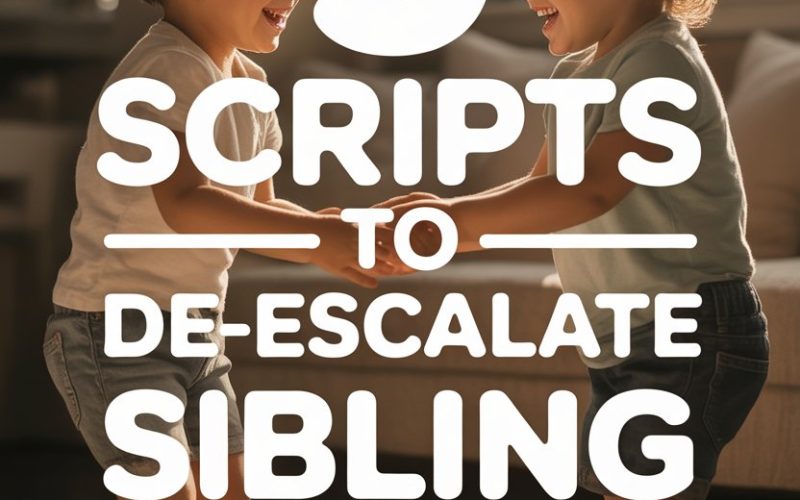If you have more than one child, you’re probably no stranger to the shrieks, stomps, and the unmistakable sound of Lego bricks being weaponized.
Sibling squabbles are as inevitable as spilt juice, but that doesn’t mean peace is a hopeless dream.
When you’re running on three hours’ sleep and your nerves are as frayed as your eldest’s favourite teddy, a few ready-made phrases can be worth their weight in gold. Or, at the very least, chocolate.
Spoiler: you’ll sound suspiciously like one of those “togetherness” parents, but you won’t have to read any books or take a parenting seminar in the process.
1. I Hear You Both
Nothing brings out the drama more than feeling misunderstood—just ask any child who’s been wronged by their sibling. When voices go up an octave and accusations start flying, step in with, “I hear you both.
It sounds like you’re both upset. Can you each tell me what happened one at a time?”
This phrase does more than just buy you precious seconds to locate your coffee. By giving both kids a chance to talk, you’re showing them that their feelings matter.
Research from the University of Cambridge highlights the power of simply being heard: it’s linked to better problem-solving skills and emotional regulation.
When you listen without immediately picking sides, you model calmness—no small feat during what feels like a cage match over a plastic dinosaur.
Of course, you may need to intervene if one child tries to shout over the other (or deploys jazz hands for emphasis). Remind them, “We’ll take turns. You’ll both get a chance.” It’s not magic, but it’s a start.
2. Can We Make a Plan Together?
Children locked in mortal combat over an iPad don’t exactly ooze logic. Still, asking, “Can we make a plan together?” helps move the conversation from tug-of-war to teamwork—well, at least for a minute or two.
This phrase works because it signals you’re not the dictator of toy time: you’re a facilitator (with more grey hair than last week).
A study out of the University of Toronto found that kids who feel involved in crafting solutions are more likely to stick to them, and less likely to resort to hair-pulling next time.
Invite the kids to brainstorm: “What’s a fair way to share?” Watch as the solutions get increasingly creative—“How about we both play at the same time, and also have ice cream?”
Even if their ideas need some gentle steering, they’ll be learning critical negotiation skills. Not every suggestion will be practical, but the ownership they feel can be surprisingly effective (and occasionally hilarious).
3. Is This a Big Problem or a Small Problem?
To a six-year-old, the blue spoon being claimed by someone else can feel like a world-ending event. This is where perspective comes in handy.
Calmly ask, “Is this a big problem or a small problem? Can you show me with your hands?”
This little script helps children pause and reflect—not always their strong suit mid-bicker.
Experts from Child Mind Institute agree that teaching kids to distinguish between small annoyances and big issues sets them up for better emotional control.
Plus, using hands to “measure” the size of the problem adds a playful twist.
You’ll be amazed at the dramatic arm spans used to emphasize the injustice of someone “looking at me funny.”
But after a few rounds, most children start to realize some arguments simply aren’t worth the fuss, and it opens the door for you to say, “If it’s a small problem, can we let it go or solve it quickly?” Surprisingly, sometimes they do.
4. What Do You Need Right Now to Feel Better?
If only every spat could be solved by a biscuit and a cuddle—but sometimes, needs run a bit deeper. Step in with, “What do you need right now to feel better?”
This question nudges kids to tune into their emotions, rather than just their sibling’s crimes against humanity. It also turns conflict into an opportunity for self-advocacy (and gives you a clue whether you’re dealing with a tired meltdown or a genuine injustice).
According to guidance from The Gottman Institute, helping children identify and voice their needs is a building block for lifelong empathy.
Don’t be shocked if the answers range from “an apology” to “the blue cup for the rest of my life.” Sometimes, just being asked is enough to cool tempers.
For bonus points, model this yourself: “I need everyone to use gentle voices if we’re going to sort this out.” It’s a subtle reminder that parents are people too (and not just snack-dispensing referees).
5. I Know You’re Both Good Kids Having a Tough Moment
When the dust settles—and it will, eventually—offer reassurance. “I know you’re both good kids having a tough moment. Let’s try again.”
This script does a few things. Your children get the message that their identity isn’t reduced to “the one who hit” or “the one who screamed.”
There’s room for mistakes and, more importantly, for trying again. Research on growth mindset shows that kids who believe they can improve after setbacks handle conflict with more resilience.
You might need to repeat this one as often as you repeat “Put your shoes on,” but it’s a gentle reminder that love isn’t conditional on perfect behavior.
In a world where siblings can flip from partners-in-crime to arch-nemeses in under a minute, knowing that family is a safe space is worth its weight in goldfish crackers.
Keeping the Peace Without Losing Your Mind
There’s no cure-all for sibling rivalry (unless you count separate holidays, which the bank balance probably doesn’t agree with).
Still, these scripts offer more than just a temporary ceasefire—they help your kids build the skills to handle bigger bumps down the line.
Will you always remember these lines in the heat of a sibling stand-off? Probably not.
Some days it’s all you can do not to laugh (or cry) at the absurdity of it all. But having a few trusty phrases tucked away can lower the volume, teach your kids to listen, and give you a smidge more sanity.
After all, you’re not just raising siblings. You’re raising future flatmates, colleagues, and (dare we say) friends.
And if you manage to get through the next fight with your dignity intact and your biscuits uneaten, well, that’s a win worth celebrating.




